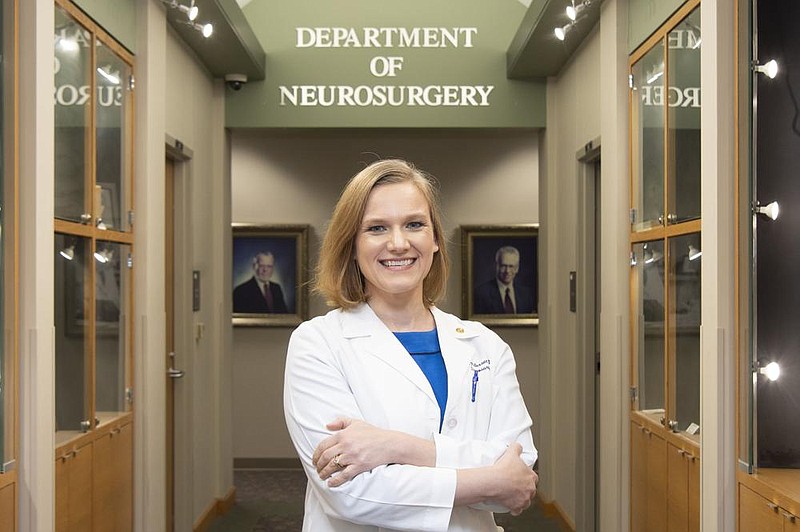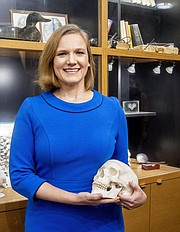Dr. Erika Petersen is not a magician's assistant. Now there might be a few souls out there under the impression that Petersen has served some time corralling doves and being sawed in half and then put back together for applause. It's not true.
Petersen isn't exactly proud that she spread this white lie but it beat having to explain her real identity and endure the intimidation that comes along with it.
Petersen's list of accomplishments is long and impressive by any measure. It starts with Petersen's being the first female neurosurgeon to be named professor in Arkansas.
Petersen graduated from the Ivy League's Princeton University on her way to becoming the neurosurgery program director at the University of Arkansas for Medical Sciences. Among her many highlights, she completed a research and clinical fellowship in functional neurosurgery at the National Hospital for Neurology and Neurosurgery in London.
"I was sick of people saying you are too smart for me," says Petersen of her magician's assistance ruse.
Her colleagues at UAMS are grateful that Petersen's magic tricks happen under the glare of lights in the operating room and in the halls of the hospital.
"I was lucky to find Dr. Petersen," says Dr. J.D. Day, chairman of the Department of Neurosurgery at UAMS. "She had other options. It would have been much easier for her to go to places that had programs in place instead of here where she has built up our program of deep brain stimulation. UAMS used to do these kinds of surgeries once or twice a year and we had to fly in the surgeon to do them. Now we do them once or twice a week."
Day credits Petersen's attitude with this transformation.
"She's gritty, she's tough. She does not take no for an answer. She is very determined and has superior intelligence."
Petersen is aware of the fact that female neurosurgeons are rare and that it's rarer still to find them in teaching positions. Petersen says, "There are a whole lot of issues that go into [the lack of female neurosurgeons]."
"There's a phrase, 'If you can't see it, you can't be it,'" Petersen says. "There are still a lot of dudes out there working in this field. There haven't been [role] models. We are still a minority and being visible is important."
GOLD AWARD
An acre of woods outside of Durham, N.C., was Petersen's and her younger sister's kingdom when they were young.
"There were fallen tree branches that became our hideouts and forts," Petersen says. "I was a Girl Scout and earned a Girl Scout Gold Award. I spent a lot of my time earning badges and camping."
While Petersen excelled in academics and took her place on Quiz Bowl teams, she wasn't averse to the outdoors.
Petersen's father, a math professor at the University of North Carolina, and mother, a bankruptcy lawyer, emphasized a variety of activities for their girls.
"They wanted us to be well-rounded and have a variety of interests," Petersen notes. "We'd go out on family hiking trips. We did a trip in my teens where we drove west out to Colorado. We stayed in campgrounds and had daily hikes. It was fun to do those outdoor activities. I took a bunch of ballet classes and we would attend performances of the local ballet company."
Then there was the no small matter of North Carolina basketball. Petersen counts herself among the many enthusiastic fans of the Tar Heels.
"I remember as a kid going to the old arena where [Michael] Jordan played," Petersen says. "Being in that arena with everybody cheering, there was so much energy. The team wasn't all that strong during the years I went."
Even during medical school, Petersen would find a way to see basketball and stay on task.
"I would take my review notes for anatomy class while standing in line to get in. I took my husband back to see a game at North Carolina at Christmas. It was his first time being there. It was fun to share that experience with him."
While Petersen liked her biology and other science classes during her high school and early college days, she didn't consider herself on a direct path to being a doctor. She had an interest in Europe and history. She wanted to learn how to speak Russian to forge a deeper connection with her family.
"My father's family is from Estonia," Petersen says. "I kind of had this idea if I wanted to visit Estonia I needed to know the history of the area and the language. I thought I might be interested in medicine but I wasn't sure," Petersen says. "There were no other doctors in my family."
However, there were moments along the way where Petersen got a glimpse of her future life.
"When I was 16, we were given a chance to observe a live surgery," Petersen says. "I got to watch a heart bypass. It was captivating certainly. You can't watch a heart go from beating to not beating and not be amazed."
A GREATER CONTEXT
The degree Petersen ultimately received from Princeton is in European history. She does not believe that her studies in this area somehow take away from her abilities as a physician. In fact, she thinks the opposite is true.
"If you devote an entire life to medicine, you can't come to discussions with your patients with a sympathetic context. Everything in my wide liberal arts background makes things more relatable to me."
In this way, Petersen's idea of healing is broader than simply a doctor performing a needed surgery or prescribing the right medicine.
"If you don't have perspective, you may not get the bigger picture," Petersen says. "You want to impact the longer term for the patient. You want to have a broader view."
This concept is what fueled Petersen to not enroll in medical school right after earning her degree at Princeton. Instead she took a job as a health care management consultant.
"A lot of doctors I spoke to at the time were telling me to not go into medicine because the business side was so awful. Being a consultant, I learned a lot about the business side of medicine and about leadership. It was a way for me to explore the other side. Ultimately I decided that my experience as a consultant wasn't enough to turn me off of medicine."
Petersen's start of medical school at the University of North Carolina was complicated by a personal tragedy. Two weeks before classes began, her mother died of cancer.
"I was focused on trying to keep one foot in front of the other," Petersen says. "The dean [of the medical school] asked if I wanted to put off school for a while. I didn't do that. Academically, I had to get a tutor to help through anatomy. But I had very supportive friends."
The medical specialty that Petersen would eventually devote all her time and energy to didn't present itself right away during her years in medical school. She did like the idea of being a cardiologist and being able to see what was wrong with a patient and then being able to treat it. That changed when she stepped in to witness a neurosurgeon at work.
"I had the same kind of visceral reaction to seeing a live human brain as I did when I witnessed a working heart during bypass surgery," Petersen says. "Seeing this pearlescent brain with the spinal fluid pulsing through it, I knew that neurosurgery would be what I would do."
A SOCIAL LIFE
The next step for Petersen took her away from her North Carolina home to Dallas where she was chief resident of neurosurgery for the University of Texas Southwestern Medical Center. Punishing as the schedule was -- 90 to 100 hours a week devoted to the cause -- she found time to squeeze in a social life.
"I was just looking for people to hang out with," Petersen says. "I was in a new city. I met my husband, Shane, there. He was working for a video editing company."
Petersen quickly realized she didn't have to use her magician's assistance line with her future husband.
"He is extremely smart and strong in his thoughts as well. He has a great sense of humor. Not every guy was as comfortable dating a brain surgeon. He is very confident and is a nice counterpart to what I do."
At UAMS now for more than 10 years, Petersen leads the way in what is known as deep brain stimulation. She treats a variety of patients.
"Deep brain stimulation works like a pacemaker for the brain," she says. "It involves placing small electrodes within territories of the brain that control specific functions, like tremors. For example, in a person with severe tremor, DBS can improve their handwriting, their ability to shave, use a fork and knife and therefore they can maintain their independence. It is truly gratifying to be able to assist patients to get control of these movement disorders."
That Petersen deals with serious problems with UAMS patients and does so successfully is easy to recognize. A patient comment on Petersen's UAMS profile sums it up, "Dr. Petersen has given me my life back."
Operating on sick patients is just one part of Petersen's work. Her day, which generally begins at 6 a.m. and usually doesn't end until past 6 p.m., is filled with teaching and research.
"I like to teach," Petersen says. "My teaching is an apprenticeship model. They are learning by my side while I am taking care of patients."
She sees her teaching and her research not as burdens but as a way to expand her reach.
"I can only do so much on my own," Petersen says. "Maybe being only a neurosurgeon I take care of hundred or so patients a year. If I am teaching, I am passing on what I know to another doctor and making an impact with hundreds and hundreds of patients. When I add research, I am impacting likely thousands. That's real value."
Petersen doesn't add "Abracadabra!" but she absolutely could.
CORRECTION: Dr. Erika Petersen is the first female neurosurgeon to be named a professor in Arkansas. A headline in an earlier version of this story was incorrect.

